 Libri di Slavoj Zizek su Unilibro.it
)
Libri di Slavoj Zizek su Unilibro.it
)
|
|
2009 |
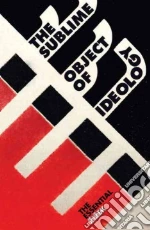 Title :
The Sublime Object of Ideology
Title :
The Sublime Object of IdeologyAuthor: Zizek Slavoj Publisher: Verso Books Slavoj Zizek, the maverick philosopher, author of over 30 books, acclaimed as the 'Elvis of cultural theory', and today's most controversial public intellectual. His work traverses the fields of philosophy, psychoanalysis, theology, history and political theory, taking in film, popular culture, literature and jokes—all to provide acute analyses of the complexities of contemporary ideology as well as a serious and sophisticated philosophy. His recent films The Pervert's Guide to the Cinema and Zizek! reveal a theorist at the peak of his powers and a skilled communicator. Now Verso is making his classic titles, each of which stand as a core of his ever-expanding life's work, available as new editions. Each is beautifully re-packaged, including new introductions from Zizek himself. Simply put, they are the essential texts for understanding Zizek's thought and thus cornerstones of contemporary philosophy. € 22,30
|
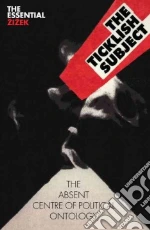 Title :
The Ticklish Subject
Title :
The Ticklish SubjectAuthor: Zizek Slavoj Publisher: Verso Books His recent films The Pervert's Guide to the Cinema and Zizek! reveal a theorist at the peak of his powers and a skilled communicator. Now Verso is making his classic titles, each of which stand as a core of his ever-expanding life's work, available as new editions. Each is beautifully re-packaged, including new introductions from Zizek himself. Simply put, they are the essential texts for understanding Zizek's thought and thus cornerstones of contemporary philosophy. The Ticklish Subject: The Absent Centre of Political Ontology: A specter is haunting Western thought, the specter of the Cartesian subject. In this book Slavoj Zizek unearths a subversive core to this elusive specter, and finds within it the indispensable philosophical point of reference for any genuinely emancipatory project. € 19,10
|
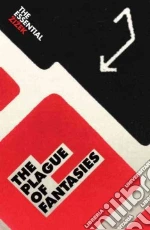 Title :
The Plague of Fantasies
Title :
The Plague of FantasiesAuthor: Zizek Slavoj Publisher: Verso Books Modern audiovisual media have spawned a 'plague of fantasies', electronically inspired phantasms that cloud the ability to reason and prevent a true understanding of a world increasingly dominated by abstractions—whether those of digital technology or the speculative market. Into this arena, enters Zizek: equipped with an agile wit and the skills of a prodigious scholar, he confidently ranges among a dazzling array of cultural references—explicating Robert Schumann as deftly as he does John Carpenter—to demonstrate how the modern condition blinds us to the ideological basis of our lives. € 16,70
|
 Title :
The Essential Zizek
Title :
The Essential ZizekAuthor: Zizek Slavoj Publisher: Verso Books Slavoj Zizek, the maverick philosopher, author of over 30 books, acclaimed as the 'Elvis of cultural theory,' and today’s most controversial public intellectual. His work traverses the fields of philosophy, psychoanalysis, theology, history and political theory, taking in film, popular culture, literature and jokes — all to provide acute analyses of the complexities of contemporary ideology as well as a serious and sophisticated philosophy. His recent films The Pervert’s Guide to the Cinema and Zizek! reveal a theorist at the peak of his powers and a skilled communicator. Now Verso are making these four classic titles, that stand as the core of his ever-expanding life’s work, available as new editions. Each is beautifully repackaged, including new introductions from Zizek himself. Simply put, they are the essential texts for understanding Zizek’s thought and thus cornerstones of contemporary philosophy. € 66,90
|
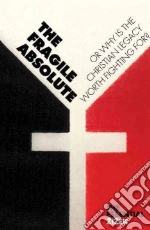 Title :
The Fragile Absolute
Title :
The Fragile AbsoluteAuthor: Zizek Slavoj Publisher: Verso Books Slavoj Zizek, the maverick philosopher, author of over 30 books, acclaimed as the 'Elvis of cultural theory', and today's most controversial public intellectual. His work traverses the fields of philosophy, psychoanalysis, theology, history and political theory, taking in film, popular culture, literature and jokes--all to provide acute analyses of the complexities of contemporary ideology as well as a serious and sophisticated philosophy. His recent films The Pervert's Guide to the Cinema and Zizek! reveal a theorist at the peak of his powers and a skilled communicator. Now Verso is making his classic titles, each of which stand as a core of his ever-expanding life's work, available as new editions. Each is beautifully re-packaged, including new introductions from Zizek himself. Simply put, they are the essential texts for understanding Zizek's thought and thus cornerstones of contemporary philosophy.The Fragile Absolute: Or, Why Is the Christian Legacy Worth Fighting For?: Zizek argues that the subversive core of the Christian legacy is much too precious to be left to the fundamentalists. He argues that the foundation of a politics of universal emancipation can be found in St Paul, finding an unlikely ally in the reinvention of a twenty-first century Marxism. € 15,50
|
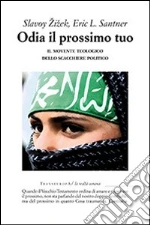 Title :
Odia il prossimo tuo. Il movente teologico dello scacchiere politico
Title :
Odia il prossimo tuo. Il movente teologico dello scacchiere politicoAuthor: Zizek Slavoj; Santner Eric L. Publisher: Transeuropa Il rapporto tra amore e odio, personale e politico, amicizia e inimicizia, vengono decostruiti in questo dialogo a distanza tra Santner e Zizek, e nee vengono svelate implicazioni solitamente non dichiarate dalle letture pigramente universaliste che di queste coppie concettuali vengono convenzionalmente offerte. Il concetto di amore per il prossimo - rivisto da Santner attraverso una rilettura di Benjamin e Rosenzweig, e da Zizek demistificato - svela le proprie radicali implicazioni teologico-politiche, e costituisce una sfida per chi si ostini a porre questioni di teoria politica normativa all'interno dei codici rassicuranti imposti dagli universalismi e contrattualismi oggi in voga. Gli autori rammentano che non vi è politica che non sia teologia politica e propongono una rivoluzione concettuale che tolga ai nostri modi di pensare alcuni alibi collaudati. € 14,90
|
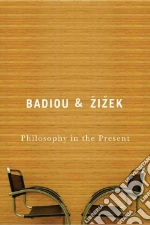 Title :
Philosophy in the Present
Title :
Philosophy in the PresentAuthor: Badiou Alain, Zizek Slavoj, Engelmann Peter (EDT), Thomas Peter (TRN), Toscano Alberto (TRN) Publisher: Blackwell Pub Two controversial thinkers discuss a timeless but nonetheless urgent question: should philosophy interfere in the world? Nothing less than philosophy is at stake because, according to Badiou, philosophy is nothing but interference and commitment and will not be restrained by academic discipline. Philosophy is strange and new, and yet speaks in the name of all - as Badiou shows with his theory of universality. Similarly, Zizek believes that the philosopher must intervene, contrary to all expectations, in the key issues of the time. He can offer no direction, but this only shows that the question has been posed incorrectly: it is valid to change the terms of the debate and settle on philosophy as abnormality and excess. At once an invitation to philosophy and an introduction to the thinking of two of the most topical and controversial philosophers writing today, this concise volume will be of great interest to students and general readers alike. € 52,00
|
 Title :
Violence
Title :
ViolenceAuthor: Slavoj Zizek Publisher: PROFILE BOOKS € 11,70
|
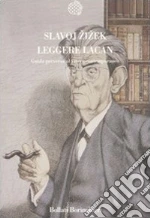 Title :
Leggere Lacan. Guida perversa al vivere contemporaneo
Title :
Leggere Lacan. Guida perversa al vivere contemporaneoAuthor: Zizek Slavoj Publisher: Bollati Boringhieri La psicoanalisi è morta? Se spesso in questo inizio di XXI secolo la domanda è stata più che altro retorica e la risposta inequivocabilmente affermativa, Slavoj Zizek in questa sua breve e incisiva introduzione al pensiero di Lacan, si lancia arditamente controcorrente: non solo la psicoanalisi è in ottima salute, ma, anzi, solo ora, in questa nostra società che spinge al godimento a tutti i costi, le intuizioni freudiane si rivelano in tutta la loro lungimiranza e lucida esattezza. Zizek parte proprio dal lacaniano 'ritorno a Freud', un ritorno sostanziale, per illustrare il pensiero dello psicoanalista francese. Così, se con Lacan la psicoanalisi è fondamentalmente un processo di lettura, Zizek in ciascun capitolo utilizza un passo dell'opera del maestro come strumento esegetico, chiave di lettura di altri testi filosofici o letterari, di fenomeni della contemporaneità, di manifestazioni della cultura pop: dalla politica estera americana all'ultimo Kubrick, da Shakespeare a Nietzsche, da '21 grammi' ad 'Alien'. Perché la psicoanalisi rimane, prima di qualsiasi applicazione clinica, uno strumento formidabile per mettere l'individuo a confronto con la dimensione più radicale dell'esistenza umana. € 16,00
Scontato: € 15,20
|
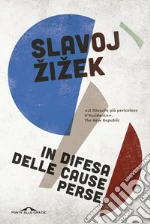 Title :
In difesa delle cause perse. Materiali per la rivoluzione globale
Title :
In difesa delle cause perse. Materiali per la rivoluzione globaleAuthor: Zizek Slavoj Publisher: Ponte alle Grazie La rivoluzione globale è una causa persa? I valori universali sono reliquie di un'età perduta o di un'epoca superata? Per paura dell'orrore totalitario che abbiamo alle spalle, siamo costretti a rassegnarci a una misera terza via fatta di liberismo in economia e di pura amministrazione dell'esistente in politica? Nella sua opera maggiore degli ultimi anni, che ha acceso feroci controversie nel mondo inglese e ne ha consacrato il successo presso un vasto pubblico, il cecchino filosofico Slavoj Zizek mira all'ideologia regnante, sostenendo che dobbiamo invece riappropriarci di numerose 'cause perse' e cercare un nocciolo di verità nelle politiche totalitarie della modernità. Perché se è vero che i Terrori di Robespierre, di Mao e dei bolscevichi si sono rivelati catastrofici fallimenti, questo giudizio non racconta tuttavia l'intera storia: in ciascuno di essi è presente un'aspirazione di 'redenzione', che va del tutto persa nelle società liberaldemocratiche, con il loro (proclamato) rifiuto dell'autoritarismo e la loro (ipocrita) esaltazione di una politica soft, consensuale e decentralizzata. Le ricette? Zizek non lesina massimalismi e ripropone in declinazioni contemporanee, ma senza attenuazioni le categorie di giustizia rivoluzionaria e uguaglianza universale. Il risultato è una salutare staffilata d'utopia, un balsamo di rara forza per i nostri giorni angusti e le nostre menti rese asfittiche dal pensiero unico, un libro capace di guardare con occhi nuovi ai più vari fenomeni culturali e politici del mondo d'oggi e di farci 'pensare l'impensabile' con strumenti impensat € 26,00
|
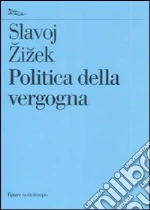 Title :
Politica della vergogna
Title :
Politica della vergognaAuthor: Zizek Slavoj; Acotto E. (cur.) Publisher: Nottetempo Il potere, secondo Zizek, abita l'inconscio e struttura i comportamenti umani attraverso forme e dispositivi 'osceni': forme che restano fuori dalla scena ma agiscono in profondità, modellando la realtà e l'ordine simbolico. Le brutalità della dittatura e della democrazia, le menzogne della biopolitica di guerra e di pace, le pieghe delle strutture psichiche e i loro riflessi corporei sono i temi di questi sei testi capaci di passare da un argomento all'altro con scarti vertiginosi e di utilizzare materiali eterogenei tratti dalla psicanalisi, dalla letteratura, dal cinema, dalla filosofia, dalla politica e dalla cronaca. Il pensiero di Zizek esplora con la stessa lucida radicalità il problema dei migranti, le torture di Abu Ghraib, la violenza nascosta della teoria liberale, la straordinaria sintesi dell'ibrido cinese o, ancora, l'immaginario della vergogna attraverso i film di Chaplin e Lynch. Una 'pop-filosofia' che apre nuove prospettive di conoscenza sul mondo contemporaneo e sulle strutture profonde che, a nostra insaputa, lo regolano. € 14,00
|
|
|
2008 |
 Title :
Zizek
Title :
ZizekAuthor: Pound Marcus, Zizek Slavoj (AFT) Publisher: Eerdmans Pub Co € 20,30
|
 Title :
Violence
Title :
ViolenceAuthor: Zizek Slavoj Publisher: Picador USA Philosopher, cultural critic, and agent provocateur Slavoj Žižek constructs a fascinating new framework to look at the forces of violence in our world. € 16,10
|
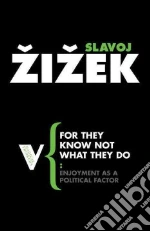 Title :
For They Know Not What They Do
Title :
For They Know Not What They DoAuthor: Zizek Slavoj Publisher: Verso Books Psychoanalysisis less merciful than Christianity. Where God the Father forgives ourignorance, psychoanalysis holds out no such hope. Ignorance is not asufficient ground for forgiveness since it masks enjoyment; anenjoyment which erupts in those black holes in our symbolic universethat escape the Father's prohibition. Today,with the disintegration of state socialism, we are witnessing thiseruption of enjoymnet in the re-emergence of aggressive nationalism andracism. With the lid of repression lifted, the desires that haveemerged are far from democratic. To explain this apparent paradox,says Slavoj Zizek, socialist critical thought must turn topsychoanalysis. For They Know Not What They Doseeks to understand the status of enjoyment within ideologicaldiscourse, from Hegel through Lacan to these political and ideologicaldeadlocks. The author's own enjoyment of “popular culture” makes thisan engaging and lucid exposition, in which Hegel joins hands withRossellini, Marx with Hitchcock, Lacan with Frankenstein, high theorywith Hollywood melodrama. € 28,70
|
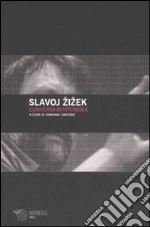 Title :
L'universo di Hitchcock
Title :
L'universo di HitchcockAuthor: Zizek Slavoj; Cantone D. (cur.) Publisher: Mimesis Questo saggio è un perfetto esempio dì cosa sia in grado di fare i! filosofo sloveno Slavoj Zizek quando può mescolare a piacimento gli ingredienti che gli sono più congeniali: psicoanalisi, cinema e filosofia. Attraverso l'analisi di uno dei più famosi film di Hitchcock, 'Psycho', Zizek espone mirabilmente le differenze che dividono usi approccio estetico moderno da uno post-moderno: mentre l'arte moderna è semplicemente shockante per il pubblico, quella postmoderna comprende in sé tutte le possibili interpretazioni che essa stessa mette in moto. La riflessione su Hitchcock diventa così al contempo auto-riflessione, considerazione critica e messa in discussione continua dei paradigmi che sorreggono le teorie estetiche, In una sorta di strabismo continuo, soggetto e oggetto della riflessione non cessano di scambiarsi di posto e di cancellare la distanza che li separa. € 11,00
Scontato: € 10,45
|
||
|
2007 |
 Title :
Enjoy Your Symptom!
Title :
Enjoy Your Symptom!Author: Zizek Slavoj Publisher: Routledge The title is just the first of many startling asides, observations and insights that fill this guide to Hollywood on the Lacanian psychoanalyst’s couch. Zizek introduces the ideas of Jacques Lacan through the medium of American film, taking his examples from over 100 years of cinema, from Charlie Chaplin to The Matrix and referencing along the way such figures as Lenin and Hegel, Michel Foucault and Jesus Christ. Enjoy Your Symptom! is a thrilling guide to cinema and psychoanalysis from a thinker who is perhaps the last standing giant of cultural theory in the twenty-first century. € 26,20
|
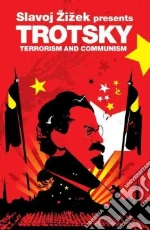 Title :
Trotsky: Terrorism and Communism
Title :
Trotsky: Terrorism and CommunismAuthor: Trotsky Leon, Zizek Slavoj (FRW), Brailsford H. N. (CON) Publisher: Verso Books Written in the white heat of revolutionary Russia's Civil War, Trotsky's Terrorism and Communismis one of the most potent defenses of revolutionary dictatorship. In his provocative commentary to this new editionthe philosopher Slavoj Zizek argues that Trotsky's attack on theillusions of liberal democracy has a vital relevance today. € 18,70
|
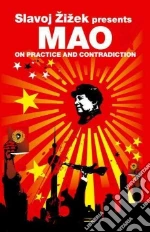 Title :
On Practice and Contradiction
Title :
On Practice and ContradictionAuthor: Mao Tse-tung, Zizek Slavoj (INT) Publisher: Verso Books These earlyphilosophical writings underpinned the Chinese revolutions and theirclarion calls to insurrection remain some of the most stirring of alltime. Drawing on a dizzying array of references from contemporaryculture and politics, Zizek's firecracker commentary reaches unsettlingconclusions about the place of Mao's thought in the revolutionary canon. € 22,60
|
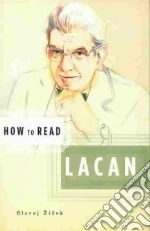 Title :
How to Read Lacan
Title :
How to Read LacanAuthor: Zizek Slavoj Publisher: W W Norton & Co Inc The How to Read series provides a context and an explanation that will facilitate and enrich your understanding of texts vital to the canon. These books use excerpts from the major texts to explain essential topics, such as Jacques Lacan's core ideas about enjoyment, which re-created our concept of psychoanalysis. Lacan's motto of the ethics of psychoanalysis involves a profound paradox. Traditionally, psychoanalysis was expected to allow the patient to overcome the obstacles which prevented access to 'normal' sexual enjoyment; today, however, we are bombarded by different versions of the injunction 'Enjoy!' Psychoanalysis is the only discourse in which you are allowed not to enjoy. Slavoj Žižek's passionate defense of Lacan reasserts Lacan's ethical urgency. For Lacan, psychoanalysis is a procedure of reading and each chapter reads a passage from Lacan as a tool to interpret another text from philosophy, art or popular ideology. € 13,40
|
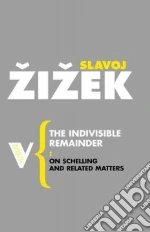 Title :
Indivisible Remainder
Title :
Indivisible RemainderAuthor: Zizek Slavoj Publisher: Verso Books The feature which distinguishes the great works of materialist thought, from Lucretius' De rerum natura through Capital to the writings of Lacan, is their unfinished character: again and again they tackle their chosen problem. Schelling's Weltalterdrafts belong to this same series, with their repeated attempt at theformulation of the 'beginning of the world,' of the passage from thepre-symbolic pulsation of the Real to the universe of logos. F.W.J. Schelling, the German idealist who for too long dwelled in theshadow of Kant and Hegel, was the first to formulate the post-idealistmotifs of finitude, contingency and temporality. His unique workannounces Marx's critique of speculative idealism, as well as theproperly Freudian notion of drive, of a blind compulsion to repeatwhich can never be sublated in the ideal medium of language. The Indivisible Remainder beginswith a detailed examination of the two works in which Schelling'sspeculative audacity reached its peak: his essay on human freedom andhis drafts on the “Ages of the World.” After reconstituting their lineof argumentation, Slavoj Zizek confronts Schelling with Hegel, andconcludes by throwing a Schellingian light on some “related matters”:the consequences of the computerization of daily life for sexualexperience; cynicism as today's predominant form of ideology; theepistemological deadlocks of quantum physics. Althoughthe book is packed with examples from politics and popular culture —the unmistakable token of Zizek's style — from Speed and Groundhog Day to Forrest Gump,it signals a major shift towards a systematic concern with the basicquestions of philosophy and the roots of the crisis of ourlate-capitalist universe, centred around the enigma of modernsubjectivity. € 17,90
|
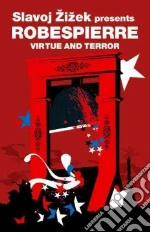 Title :
Virtue and Terror
Title :
Virtue and TerrorAuthor: Robespierre Maximilien, Zizek Slavoj (INT) Publisher: Random House Robespierre's defense of the French Revolution remains one of the most powerful and unnerving justifications for political violence ever written, and has extraordinary resonance in a world obsessed with terrorism and appalled by the language of its proponents. Yet today, the French Revolution is celebrated as the event which gave birth to a nation built on the principles of enlightenment. So how should a contemporary audience approach Robespierre's vindication of revolutionary terror? Zizek takes a helter-skelter route through these contradictions, marshaling all the breadth of analogy for which he is famous. € 16,70
|
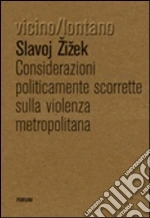 Title :
Considerazioni politicamente scorrette sulla violenza metropolitana
Title :
Considerazioni politicamente scorrette sulla violenza metropolitanaAuthor: Zizek Slavoj; Cantone D. (cur.) Publisher: Forum Edizioni Le considerazioni su alcuni degli avvenimenti che hanno avuto maggiore eco sulla stampa mondiale negli ultimi anni - come l'uragano Katrina a New Orleans e le sommosse popolari nella banlieue parigina - sono il punto di partenza per una riflessione di più ampio respiro intorno ad un problema che s'impone per la sua urgenza e importanza: l'emergere della violenza nella nostra società 'post-storica'. Si tratta di un tipo di violenza del tutto nuova, priva di qualsiasi afflato utopico o progetto rivoluzionario, una violenza 'irrazionale' e impotente, come un'esplosione di follia. Secondo l'autore sono proprio le democrazie occidentali, con i loro sistemi di valori 'universali' e i loro dispositivi di controllo a esserne la causa diretta, dal momento che impediscono di fatto qualsiasi processo di soggettivazione al di fuori delle proprie regole. È dunque ipocrita condannare semplicemente la violenza: è molto più costruttivo interrogarci seriamente su quale ruolo le riserviamo oggi, anche se ufficialmente le neghiamo diritto di cittadinanza nel nostro ordinamento sociale. € 9,00
|
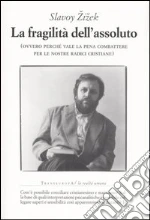 Title :
La fragilità dell'assoluto (ovvero perché vale la pena combattere per le nostre radici cristiane)
Title :
La fragilità dell'assoluto (ovvero perché vale la pena combattere per le nostre radici cristiane)Author: Zizek Slavoj Publisher: Transeuropa Con questo articolato ed energico contributo al dibattito filosofico e politico contemporaneo, Slavoj Zizek - attraverso una prosa elettrica e vivace, contraddistinta dai suoi proverbiali e numerosissimi riferimenti alla cultura popolare e al cinema - si scaglia contro le banalizzazioni con cui oggi giorno si guarda ai fenomeni sociali e culturali, recuperando in chiave emancipatrice uno dei punti qualificanti della nostra tradizione culturale occidentale: il cristianesimo. Grazie a una riconsiderazione del messaggio di san Paolo, riletto anche nella prospettiva di Alain Badiou, Zizek cerca di ricapitolare i momenti di 'fragilità' che attraversano la nostra esperienza, quando questa si converte a una forma di desiderio inteso come atteggiamento positivo verso la realtà e la sua verità, al di là di ogni possibile mistificazione. Zizek sorprende il lettore a ogni riga perché si scaglia contro ogni conformismo intellettuale, contro ogni convenzionalità interpretativa, e contro ogni posizione politicamente corretta. Questo libro ne è un esempio perfetto. Ricominciare a parlare della radicalità sovversiva del pensiero cristiano, recuperando - attraverso il grimaldello della psicanalisi, da Freud a Lacan - il filo rosso che lo lega al marxismo, è un gesto che può fornire strumenti di analisi più aderenti alla complessità del tempo che abitiamo. € 15,00
|
|
|
2006 |
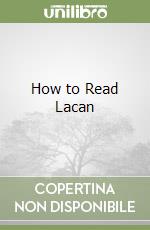 Title :
How to Read Lacan
Title :
How to Read LacanAuthor: Slavoj Zizek Publisher: Granta books Since for Lacan psychoanalysis itself is a procedure of reading, each chapter uses a passage from Lacan as a tool to interpret another text from philosophy, art or popular ideology. € 13,05
|
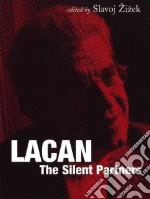 Title :
Lacan
Title :
LacanAuthor: Zizek Slavoj (EDT) Publisher: Random House Inc Jacques Lacan is the foremost psychoanalytic theorist after Freud.Revolutionising the study of social relations, his work has been a majorinfluence on political theory, philosophy, literature and the arts, but histhought has so far been studied without a serious investigation of itsfoundations. Just what are the influences on his thinking, so crucial to itsproper understanding? In Lacan: The Silent Partners Slavoj Zizek, the maverick theorist andpre-eminent Lacan scholar, has marshalled some of the greatest thinkers of ourage in support of a dazzling re-evaluation of Lacan's work. Focussing onLacan's 'silent partners', those who are the hidden inspiration to Lacaniantheory, they discuss his work in relation to the Pre-Socratics, Diderot, Hegel,Nietzsche, Schelling, Hölderlin, Wagner, Turgenev, Kafka, Henry James andArtaud. This major collection, including three essays by Zizek, marks a new era inthe study of this unsettling thinker, breathing new life into his classic work. Contributors: Alain Badiou, Bruno Bosteels, Miran Bozovic, Lorenzo Chiesa,Joan Copjec, Mladen Dolar, Timothy Huson, Fredric Jasmeson, Adrian Johnston,Sigi Jöttkandt, Silvia Ons, Robert Pfaller, Alenka Zupancic and Slavoj Zizek. € 34,20
|
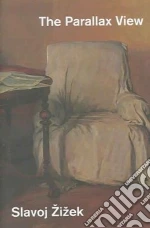 Title :
The Parallax View
Title :
The Parallax ViewAuthor: Zizek Slavoj Publisher: Mit Pr The Parallax View is Slavoj Zizek's most substantial theoretical work to appear in many years; Zizek himself describes it as his magnum opus. Parallax can be defined as the apparent displacement of an object, caused by a change in observational position. Zizek is interested in the 'parallax gap' separating two points between which no synthesis or mediation is possible, linked by an 'impossible short circuit' of levels that can never meet. From this consideration of parallax, Zizek begins a rehabilitation of dialectical materialism.Modes of parallax can be seen in different domains of today's theory, from the wave-particle duality in quantum physics to the parallax of the unconscious in Freudian psychoanalysis between interpretations of the formation of the unconscious and theories of drives. In The Parallax View, Zizek, with his usual astonishing erudition, focuses on three main modes of parallax: the ontological difference, the ultimate parallax that conditions our very access to reality; the scientific parallax, the irreducible gap between the phenomenal experience of reality and its scientific explanation, which reaches its apogee in today's brain sciences (according to which 'nobody is home' in the skull, just stacks of brain meat--a condition Zizek calls 'the unbearable lightness of being no one'); and the political parallax, the social antagonism that allows for no common ground. Between his discussions of these three modes, Zizek offers interludes that deal with more specific topics--including an ethical act in a novel by Henry James and anti-anti-Semitism.The Parallax View not only expands Zizek's Lacanian-Hegelian approach to new domains (notably cognitive brain sciences) but also provides the systematic exposition of the conceptual framework that underlies his entire work. Philosophical and theological analysis, detailed readings of literature, cinema, and music coexist with lively anecdotes and obscene jokes. € 22,70
|
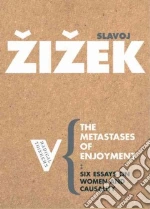 Title :
The Metastases of Enjoyment
Title :
The Metastases of EnjoymentAuthor: Zizek Slavoj Publisher: Verso Books The experience of the Yugoslav war and the rise of 'irrational' violence in contemporary societies provides the theoretical and political context of this book, which uses Lacanian psychoanalysis as the basis for a renewal of the Marxist theory of ideology. The author's analysis leads into a study of the figure of woman in modern art and ideology, including studies of The Crying Game and the films of David Lynch, and the links between violence and power/gender relations. € 20,50
|
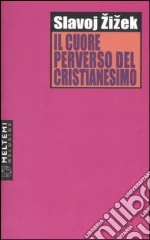 Title :
Il cuore perverso del cristianesimo
Title :
Il cuore perverso del cristianesimoAuthor: Zizek Slavoj; Senaldi M. (cur.); Illarietti G. (cur.) Publisher: Meltemi Secondo l'autore il Cristianesimo è la più perversa delle religioni: Dio Padre, che pone in mezzo al Paradiso l'Albero della Conoscenza e poi proibisce alle sue creature di gustarne i frutti, agisce da perverso, e perversa è la macchinazione di sacrificare il proprio Figlio per salvare quelle stesse creature da Lui spinte a peccare. Eppure nonostante tutto questo - o forse proprio per questo - il Cristianesimo resta anche la sola religione autenticamente 'rivoluzionaria', in grado di interrompere 'l'opacità dell'Essere' e di far riflettere sulla condizione paradossale dell'uomo. Ecco perché Slavoj Zizek arriva a sostenere, da un punto di vista completamente ateo, che 'per essere un vero materialista dialettico bisogna andare fino in fondo all'esperienza cristiana'. La vera esperienza cristiana, infatti, non consiste nella fede nel Grande Altro divino, ma nella tragica consapevolezza dell'impotenza radicale di Dio: «la vera comunione col Cristo, la vera imitatio Christi, è partecipare al dubbio di Cristo stesso e alla sua radicale disillusione». Riproponendo gli antichi dilemmi agostiniani e kierkegaardiani, Zizek fornisce con questo saggio una visione sovversiva dell'eterno problema di Dio. € 18,00
|
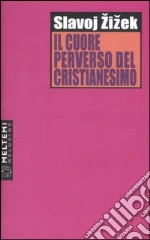 Title :
Il cuore perverso del cristianesimo
Title :
Il cuore perverso del cristianesimoAuthor: Zizek Slavoj; Senaldi M. (cur.); Illarietti G. (cur.) Publisher: Booklet Milano Secondo l'autore il Cristianesimo è la più perversa delle religioni: Dio Padre, che pone in mezzo al Paradiso l'Albero della Conoscenza e poi proibisce alle sue creature di gustarne i frutti, agisce da perverso, e perversa è la macchinazione di sacrificare il proprio Figlio per salvare quelle stesse creature da Lui spinte a peccare. Eppure nonostante tutto questo - o forse proprio per questo - il Cristianesimo resta anche la sola religione autenticamente 'rivoluzionaria', in grado di interrompere 'l'opacità dell'Essere' e di far riflettere sulla condizione paradossale dell'uomo. Ecco perché Slavoj Zizek arriva a sostenere, da un punto di vista completamente ateo, che 'per essere un vero materialista dialettico bisogna andare fino in fondo all'esperienza cristiana'. La vera esperienza cristiana, infatti, non consiste nella fede nel Grande Altro divino, ma nella tragica consapevolezza dell'impotenza radicale di Dio: 'la vera comunione col Cristo, la vera imitatio Christi, è partecipare al dubbio di Cristo stesso e alla sua radicale disillusione'. Riproponendo gli antichi dilemmi agostiniani e kierkegaardiani, Zizek fornisce con questo saggio una visione sovversiva dell'eterno problema di Dio. € 18,00
|
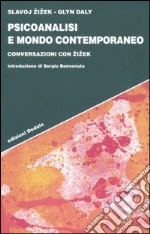 Title :
Psicoanalisi e mondo contemporaneo. Conversazioni con Zizek
Title :
Psicoanalisi e mondo contemporaneo. Conversazioni con ZizekAuthor: Zizek Slavoj; Daly Glyn; Benvenuto S. (cur.) Publisher: edizioni Dedalo In queste cinque conversazioni, Slavoj Zizek riassume i punti fondamentali del suo pensiero, riproponendo in modo sintetico le idee che lo hanno reso celebre nel corso degli ultimi 15 anni. Zizek è da tempo all'avanguardia nel dibattito filosofico, politico e culturale, ed è noto per le sue teorie, ampiamente basate sulla psicoanalisi di Lacan, su un ampio spettro di temi che includono il cyberspazio, la globalizzazione, il cinema, la musica, l'opera e la cultura di massa. In queste conversazioni si affrontano vari temi: dalla filosofia alla psicoanalisi, dai film di Kubrik alla nozione di godimento, dal marxismo al marchese de Sade, dal nazismo ai dilemmi bioetici nell'epoca della biogenetica. € 20,00
Scontato: € 19,00
|
||

|

|

|

|